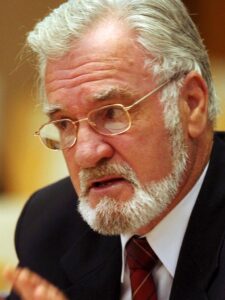COVID-19 comes to all. I thought I had some idea where I picked it up. I have limited contact with people, because my disability makes it difficult moving around, especially when there are steps. Until you are disabled, you do not realise how difficult it is to avoid them; the world is not a level field.
The virus is harassing my upper respiratory system, and it has been a challenge to dislodge the tenacious phlegm. The whole picture is that of congested misery.
On Wednesday last, we drove from Swan Hill to Albury, a distance of about 400 kilometres. Lunch was a Cornish pasty and coffee in the shade of pepper trees in Wycheproof.
By the time we arrived in Albury, I had developed a cough, and initially my RAT was negative; but next day it was positive. The inevitable march of the Virus through the house had commenced. By the weekend, we were all RAT positive. For us, it was inconvenient to say the least to be away from home, but at least we were isolating ourselves.
 I was prescribed Lagevrio (molnupiravir). Paxlovid (nirmatrelvir/ ritonavir), the other antiviral drug, was contraindicated.
I was prescribed Lagevrio (molnupiravir). Paxlovid (nirmatrelvir/ ritonavir), the other antiviral drug, was contraindicated.
Of course, there are no controls to confirm whether Lagevrio had any effect, but now with the cocktail of vaccines and anti-viral capsules, I seem to be holding my own. I have just taken my last four capsules. The congestion has much improved, but is still lingering.
In Albury there has been a supply shortage of antivirals. For a time early in the week Albury may have been in danger of running out of the antiviral drugs if promised deliveries didn’t eventuate. Familiar? Here we go again. Governments blithely change the conditions for availability without determining whether there is a sufficient supply. It is a nightmare, when we – like so many others – are confined to home and depend on the drugs being delivered.
I remember my last tussle with the flu about five years ago. That lasted six weeks with a residual cough for months afterwards., I could see the long dark corridor where there are no open doors and no light at the end.
The pandemic has persisted. Public health measures are now a matter of choice in regard to responsibility. No longer any of those public measures – such as contact tracing, hand washing, masks, social distancing observed. They work, but just as our forefathers did not throw away their weapons because WW11 persisted for more than two years, there is no reason why we could not have adapted if we had had anywhere decent leadership, beyond shutting borders.
Quarantine facilities have been built at great cost, but it seems nobody has thought how to use them. This is very ironic given the decades long experience of confining boat people. Having experienced a period of being in lockdown without any ability to go out, these facilities present the opportunity to enable that group of people to have a shelter until the infective status changes.
It is amazing to see how technology, through the manufacture of new vaccines, anti-virals and diagnostic tests, even down to improved masks, has occurred.
But such improvement in the efficiencies of social practices has lagged, and we all should share the blame, not just Dr Murphy. Nevertheless, it was a time when, except for brief flashes of government accepting responsibility and not blaming everybody else, our social structures have been found lacking. The pandemic still rages; thank God for the scientists and technologists who have provided some weapons, but the virus is far from unconditional surrender.
By the way, a week after testing positive, I am still positive, albeit weakly.

Can you believe these remnants of the Dark Ages!
When I was a first-year medical graduate working at a suburban hospital, one of my earliest memories was coming out of one of the emergency bays on my way to the next when I looked up. At the end of the corridor of flapping curtains against the emergency department wall was a trolley. On the trolley was a young woman who had apparently just been wheeled in and was waiting for a bay in which she could be seen. She was very pale, very grey; she looked very sick, even from where I was standing.

Immediately, I remembered I had seen her in the emergency department the previous day. She was complaining of a vague lower abdominal pain.
She said she was not pregnant, but she did have some tenderness in the left fornix. She was unmarried; and it was a time when if you were unmarried and under the age of 21, there was a mixture of denial, stigma in her history, and yesterday she had not looked unwell, certainly not as she was now.
I could suspend belief or rationalise why I had missed the diagnosis, so obvious as I looked at her with that grey pallor of impending disaster.
In those days, when you graduated you were considered fully fledged. That was it. Your training wheels had been removed. You could practice unsupervised after you had been through six years of undergraduate education. I had stuffed up. Looking at her lying on a trolley I knew that I had missed an ectopic pregnancy. I had stuffed up.
I moved with the speed of a penitent, and I immediately ordered that she be taken to the operating theatre. The senior obstetrics resident was alerted and in turn the general practitioner obstetrician. The operation to remove the ectopic pregnancy was successful. Nobody stood around, arguing her clinical diagnosis. They just saved her life; no problem.
I learnt a lesson that day; and my peers were forgiving. It just confirmed that if you stuff up, admit it and learn; then recriminations are somewhat superfluous. There was none of the huge panoply of undertaking root cause analysis or any of the fancy names designed by bureaucrats to define the scapegoat , the sacrificial offering to protect the system from the predations of legal jackaldom.
Where am I leading? Ectopic pregnancy requires termination for the health of the mother. The embryo is developing outside the uterus, and undiagnosed or untreated will eventually cause a catastrophic haemorrhage and maternal death.
When I was a young doctor, chemical treatment of ectopic pregnancy did not exist. The drug methotrexate was introduced to destroy the ectopic pregnancy. Methotrexate can kill a wide and diverse number of targets, including the ectopic embryo. Usually given in a single injection, methotrexate has a cytotoxic effect on the trophoblastic tissue – the cells that enable the embryo to stick in normal circumstances to the uterine wall.
Methotrexate treatment of ectopic pregnancies is considered safe, effective and cheap, with no major side effects. Intramuscular methotrexate has the advantage of tubal conservation and saves patients from requiring surgery. It is easier to administer than intraoperative route, which these days is laparoscopic and hence needs expertise.
Now what is happening in the Redneck States of the America?
In addition to surgical abortions, anti-abortion laws in some states such as Texas have also banned several drugs that can be used for inducing abortions. Among the medicines banned under these laws include drugs such as methotrexate, mifespristone, and misoprostol. Besides inducing abortion, these medications are also used for the treatment of other conditions.
Moreover, these laws allow the state to prosecute health care prescribers and pharmacists for dispensing such abortion-inducing medications.
Recent reports suggest that the reversal of abortion rights has also indirectly impacted women who use these medications for conditions other than for a medication abortion.
Although States such as Texas have banned these medications for terminating pregnancies, the laws permit the use of these drugs for miscarriages and ectopic pregnancies.
However, the fear of penalties, including being criminally charged, has resulted in some pharmacists refusing to dispense these drugs for the above.
In addition to ectopic pregnancies, methotrexate can suppress the activity of the immune system and is used in the treatment of autoimmune conditions, including rheumatoid arthritis, scleroderma, and lupus. Methotrexate is also used for the treatment of inflammatory bowel disease and a variety of cancers, including breast cancer, lymphoma, leukemia and lung cancer. Depending on the nature and severity of the disease, the dosage required varies; for a period I was prescribed the drug but in a far lower dose than required for neoplasia – or ectopic pregnancy for that matter.
Nevertheless, in these anti-abortion States , believe it or not, there are reports of disrupted access to methotrexate for patients with autoimmune disorders. Some rheumatologists have stopped renewing prescriptions for methotrexate, and moreover pharmacists are refusing to dispense.
Paradoxically, methotrexate can cause birth defects.
This has had a knock-on effect. The risk of birth defects and the lack of access to abortions have made rheumatologists wary of prescribing methotrexate to women of childbearing age with these concurrent diseases. As one source has said: “Frankly, methotrexate is one of my go-to medications for any number of diseases, including rheumatoid arthritis, psoriatic arthritis, systemic lupus erythematosus, myositis, and systemic sclerosis. I expect that some rheumatologists will understandably worry about prescribing methotrexate to patients because if the patient inadvertently became pregnant, the foetus has now been exposed to this medication. This is really worrisome as methotrexate is a very effective medication that we rely on to treat a number of debilitating and serious autoimmune diseases.”
Indeed.

Now America has John Roberts as the de facto Surgeon-General. He presides over a Supreme Court which could be reasonably considered is now the legal equivalent of the untreated ectopic pregnancy – eventually if left alone it will all end up in tears – however you pronounce it.
America remains untreated. We await the death of this motherland in the eventual haemorrhage of a Constitution constructed when the population had a median life expectancy of 35 years.
Eventually, the blood of all is shed. See, your gloves, Chief Justice Roberts, are smothered in the blood of your country, shed for no-one but the hubris of your colleagues.
The Unsinkable Molly White
Anissa Gardizy a 35 year old reporter on the Boston Globe. Her short biography states that Anissa Gardizy is a general assignment business reporter. She graduated from Emerson College with a B.S. in journalism and took economics classes at Framingham State University. Prior to joining the Globe full-time, Anissa was a co-op on the business desk, and she held internships at the Telegram & Gazette in Worcester and The Information in San Francisco.
Below is her recent profile of Molly White, who had to take time out because of her robust criticism of cryptocurrency. She has been verbally attacked; which probably means she has obviously come too close to the festering centre of cryptocurrency activity.
Ms Gadizy writes:
Depending on whom you ask, cryptocurrency is either digital snake oil or revolutionary technology. Crypto markets have plunged in recent weeks and everyone is looking for answers.
So it makes sense that a website dedicated to documenting mishaps, failures, and scams in the industry is suddenly taking off. And who’s behind it? Molly White, a 29-year-old Wikipedia enthusiast and former HubSpot employee who has emerged as one of the industry’s most pointed critics.
How the 2016 Northeastern University graduate, who lives in the Boston area, came to be one of the most listened-to people on crypto and blockchain tech is complicated. But it started in the past year, when the field became impossible to ignore.
The price of bitcoin surged to an all-time-high of nearly $70,000 in November. Ads for crypto companies were featured during the Super Bowl. Celebrities changed their Twitter profile pictures to non-fungible tokens, or NFTs. Some of White’s friends began quitting their traditional tech jobs to work for crypto firms.
White, a longtime Wikipedia editor on the side, started to research the technology. But the more she learned, the more she realized crypto was being marketed as something everyone should be getting into, despite a history rife with fraud, scams, and predatory marketing.
“[I was] seeing people get screwed over again and again and again,” White said. “There wasn’t a permanent record of what was actually happening and how poorly a lot of these projects were ending.”
Her first instinct was to start writing Wikipedia articles about crypto and the related field of “web3.” But she quickly realized Wikipedia wouldn’t be the best place for her work — among other things, it would have required her to take a neutral approach.
“I have a pretty strong opinion,” she said.

So late last year, while working full-time at HubSpot, White created a website called “Web3 is Going Just Great”. (The name is as sarcastic as it sounds, with the longer version ending with “…and is definitely not an enormous grift that’s pouring lighter fluid on our already smouldering planet.”) On the site, she chronicles — sometimes several times a day — bad things happening in crypto.
“There’s a narrative that’s become so loud and pervasive, that everyone should be getting involved in this,” she said. “It feels like I have this obligation to speak out about it.”
And others are listening.
She is regularly quoted by national news outlets, was a guest lecturer at Stanford University, and has advised US senators, including Senator Elizabeth Warren, on blockchain and cryptocurrency.
As White has learned over the past year, criticizing crypto isn’t easy. In a space known for unwavering optimism and “bro culture,” she’s the outspoken opponent pointing out its problems.
White has been the victim of online harassment, doxxing (when private information is revealed about someone), and threats of violence. As a result, she doesn’t share much identifying information about her family or where she lives.
White, who grew up in Maine, started editing on Wikipedia around the time she was 13. “My family knew I was doing it, and to some extent my friends knew,” she said. “It was kind of just like, ‘Oh, that’s one of Molly’s weird hobbies.’”
Though she got started writing about her favourite bands, White now focuses on controversial viewpoints and male-dominated spaces, including right-wing extremism and “involuntary celibates,” or incels. She has also served on the site’s arbitration committee, which settles its toughest disputes.
Andrew Lih, a Wikipedia veteran who has known White since she was a teen, said most editors concentrate on topics they take a personal interest in. White, he said, tackles things “she absolutely doesn’t like.”
“She wants to make sure the record has the best information,” he said.
Lih credits White’s rise to her ability to present information in a way that is digestible. On her crypto website, she writes in a terse, matter-of-fact style and uses hashtags such as #yikes, #badidea, and #hmm. She isn’t condescending or alarmist, either.
Unlike some critics, White doesn’t think all crypto is a scam. Rather, she believes there has been an explosion of “really scam-y projects” that downplay the risks. She worries crypto is being cast as a “ticket to financial freedom” to people who don’t have money to lose.
According to data published by the Federal Trade Commission, more than 46,000 people have reported losing over $1 billion in crypto to scams since the start of 2021.
Long term, White believes crypto will likely exist as a niche, speculative vehicle for high-risk takers.
Most people would agree that regulators need to address crypto scams for the industry to be viable. More controversial is White’s sceptical view of blockchain, crypto’s underlying technology, which has been hyped in recent years as a potential cure-all for problems related to Internet security, privacy, and financial systems. Blockchains are public, electronic databases that are distributed across a network of computers. The technology is intended to be immutable (meaning records can’t be modified) and decentralized (meaning data are stored across the network and not held by any central party.)
Proponents believe blockchain tech could eventually transform everything from financial systems to social media, creating a digital world where individuals have increased control over their own data. Many people refer to this blockchain-based vision as “web3.”
There’s been a proliferation of venture capitalists, startups, and politicians touting its potential, including a growing cluster in Boston. Late last month, hundreds of people attended an all-day summit on web3 on the top floor of the MIT Media Lab, put on by venture capitalist John Werner. It drew industry heavyweights, including cryptographer Stuart Haber, who co-invented the blockchain.
But White doesn’t think blockchain is revolutionary technology. Last month, she and a group of about two dozen computer scientists, researchers, and academics, signed a letter to US lawmakers to express their concerns about the field. Signatories included well-known technology figures like Harvard lecturer and cryptographer Bruce Schneier, Boston-based entrepreneur Miguel de Icaza, and software engineer Grady Booch.
“By its very design, blockchain technology is poorly suited for just about every purpose currently touted as a present or potential source of public benefit,” they wrote, calling it a “solution in search of a problem.”
White’s critics say the technology is in its early stages and will improve. But she disagrees, noting that the two most popular cryptocurrencies have been around for more than a decade. She also thinks blockchain, by design, contains inherent flaws — such as the inability to edit or delete data — that will make it difficult to use and potentially even harmful.
Greg Raiz, managing director of Techstars Boston — which just launched a crypto accelerator program with Boston-based blockchain firm Algorand — disagrees with White’s assertion that crypto is past its early days. In fact, he said it feels like “we’re still in the first inning of this game.”
While he doesn’t think blockchain will be the “solution to everything,” he isn’t writing off its potential to address social, monetary, and business problems. He added that criticism of web3 is “super healthy.”
“Any type of unbalanced exuberance toward a technology isn’t great,” Raiz said.
Sounds that he is pronouncing an “Amen” to the unsinkable Molly.
Parliamentary staffing
The first reaction to the protesters of the newly-elected backbenchers – not aligned to any particular party – to a reduction in the four advisers to one in line with other back benchers, was that of the howls of the deprived. Really, you poor diddums – only one adviser and four electorate officers. When perceived as privileged already, complaining about the level of the porks, is one way to lose the electorate, especially before you have even placed your toe in the political water. I was surprised when Dave Pocock started the Whimper.
In 1973, the Leader of the Opposition had a Press Secretary, a Principal Private Secretary (PPS), a Deputy Private Secretary and an Assistant Private Secretary. There was one other adviser who was from the government and picked up much of those tedious jobs and fashioning questions on notice and an add on to the Parliamentary Library. Needless to say, we were all male, and the secretarial staff who did all the work were women. I was the PPS. However, the Leader of the Opposition was thus limited to four advisers, including the Press Secretary – not one backbencher.
I believe it was more important not to interfere with the electorate staffing. For senior members of any party the electorate secretary is very important to remind even the Prime Minister that he represents an electorate, even if it may be traditionally very safe. Nowadays that cannot be guaranteed. Thus, the electorate office is an important bastion. In the case of the backbencher, especially those who have gained their seat by the adroit use of social media to win the popular vote, their activity will be augmented by an electorate office, government funded. Cathy McGowan in the northern Victorian electorate of Indi is an important bellwether since she developed an electorate office system, which was shown to be transferable to her successor, Helen Haines.

As the sociologist Max Weber observed, charismatic leadership is very dependent on the individual’s appeal, but in her case McGowan (an unlikely charismatic) was able to “bureaucratise” the electorate staff so her successor did not need to change the systemic aspects of the McGowan legacy. In other words, the model was robust enough to survive the transition from one to another strong-willed woman.
McGowan concentrated on her electorate and where she thought relevant generalised the needs to that of Australia. Maybe the fact that she came from a large cohesive family provided her with a model for an electorate office, but whatever it was, her electorate brew worked.
Developing her model from an electorate base provides a challenge for the new raft of independents, whatever their colour. She had a strong personal appeal, which translated into strong personal loyalty by her staff. She did it with a strong electorate profile, which contrasted with the dysfunctional style of her predecessor.
A backbencher needing Canberra advisers is presented with the aspirant jetsam seeking to float as a successful “factional candidate” onto a red or green parliamentary cushioned sinecure. At this pupa stage the adviser may be more akin to N’drangheta Consigliere admixed with a tincture of Undergraduate Puerilism. Policy development is not one of the skills of this Canberra hybrid. More, it is a question of hanging out, gossiping, and covering the underlying boredom of those without any constructive thought coupled with outbursts of anti-social behaviour – sexism, drunkenness and sexual harassment.
Policy becomes a joke; so-called policy becomes exercises in plagiarism – or just the “smart-arse” taking the role of the cynic – tearing down all constructive thought on the grounds that they are protecting Absolute Truth – otherwise excused as the role of the Devil’s advocate. Undertaking policy development is a skill, imperfect at best. It is a special quality requiring knowledge, so you know that you are not re-inventing policies that have been shown not to work, and enough knowledge to provide objectivity in an ocean of bias coupled with an ability to write clearly and succinctly. These skills lie outside the normal skill set of the normal adviser appointee.

Well, minimising the number of advisers minimises the number of people designed to irritate and thus it seems leaving it at one each for all backbenchers is probably about right. Only need one person to get your dry cleaning, run errands, and ensure that the backbencher has his or her ego combed daily.
Mouse Whisper
Don’t know whence it came. Just a scrap of paper with the title “Death of a Babyweight.”
…needless to say, the comment was met with gales of laughter, but then that was another time when the sun shone and they were feckless and shallow students; and yes, the Associate Professor was as Federico would say a total bunghole who played the World for cheap laughs a person who always knew the mouse to kick – and now lies increasingly forgotten – someone essentially trivial.
Perhaps you will understand the allusion, illusion and in the end the confusion.






 The value of the bulb during this hectic three period provided a way to extricate oneself from, if not poverty, at least to being able to afford a decent house -only if you sold early. However, given where many of the transactions took place as the author of Tulipomania wrote: “The trade was conducted for the most part in a haze of inebriation.”
The value of the bulb during this hectic three period provided a way to extricate oneself from, if not poverty, at least to being able to afford a decent house -only if you sold early. However, given where many of the transactions took place as the author of Tulipomania wrote: “The trade was conducted for the most part in a haze of inebriation.”


